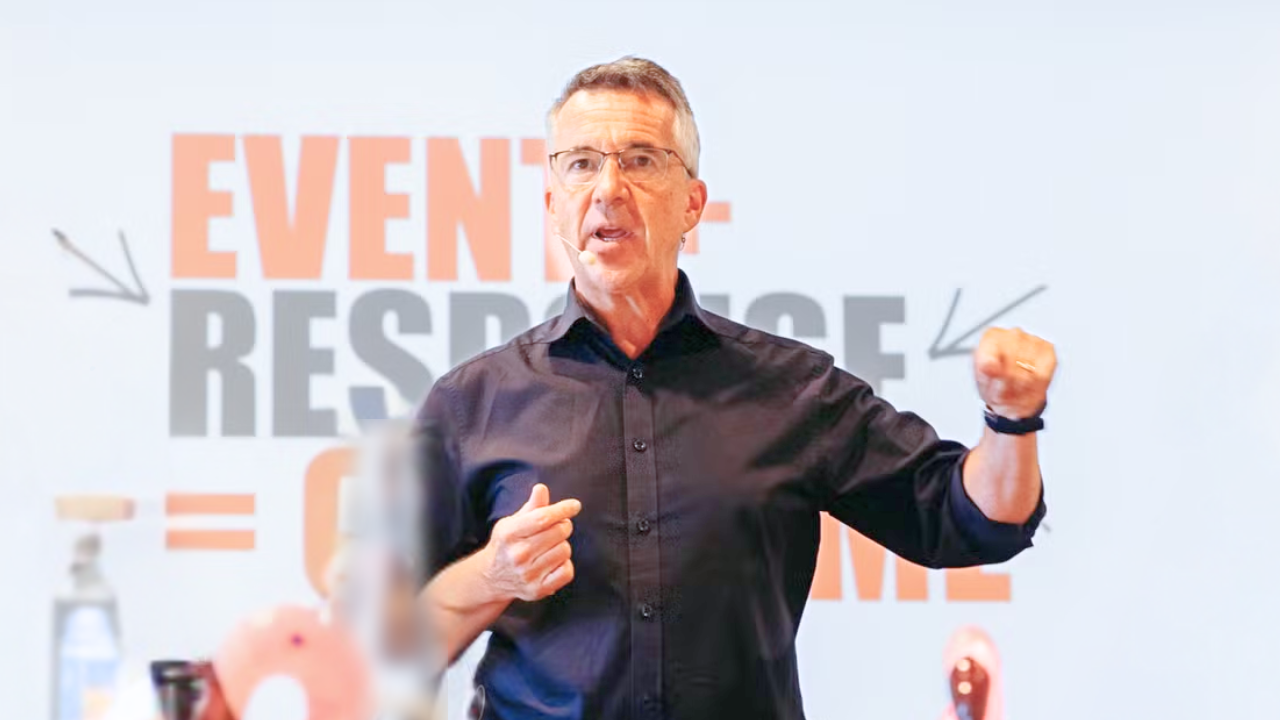Paul McGee, famously known as “The SUMO Guy,” has built a remarkable career out of blending humour, psychology, and insightful life lessons into transformative talks.
From humble beginnings as a manager in a beef burger factory in the UK, (“Lesson number one: don’t eat economy beef burgers, because I know what goes into them!”), his life took an unexpected turn when Chronic Fatigue Syndrome left him debilitated in his mid-20s.
But rather than let his illness define him, Paul chose to transform his life, creating a movement that would touch the lives of countless people across the globe.
“I went from being a high-flying graduate management trainee with a multinational to being on invalidity benefit and using a walking stick.”
At a recent keynote address at Elite Retreat, Paul explained that the heart of his philosophy is encapsulated in SUMO, which stands for “Shut Up, Move On” or “Stop, Understand, Move On.”
SUMO is not just about dismissing problems but about choosing how to respond to life’s inevitable challenges.
“Every day is a choose day,” Paul often says, emphasising that life is full of choices, even in adversity.
“In Latin, SUMO means ‘to choose,’ and at the heart of my work is helping people make wiser choices.”
Personal responsibility
It became a common theme in his presentation and Paul shared several impactful lessons on taking personal responsibility.
“It’s not the event that shapes your outcome,” he explained, “it’s how you respond.”
He illustrated this through his famous formula: E + R = O, where E stands for the Event, R is your Response, and O is the Outcome.
He reminded the audience that while we cannot always control the events that happen to us, we can control how we respond to them.
“You’re not responsible for your first reaction,” Paul said, “but you are responsible for your first action.”
This message resonated deeply with the audience, especially those working in the fast-paced and unpredictable real estate industry where outcomes often feel out of their control.
But, as Paul explained, shifting the focus from the uncontrollable events to your own response could empower you to create better outcomes.
“If two people experience the same event, why do they often end up with different outcomes? It’s because of how they responded,” Paul told the crowd.
“It’s never just the event; it’s how you respond that influences the outcome.”
To drive this point home, Paul illustrated the importance of understanding different perspectives, using the metaphor of a giant, multi-coloured beach ball.
“Imagine this beach ball is 50 times the size it is, and you’re all standing at the back of the room. From your angle, it’s red, green, and white. Your view isn’t incorrect, but it may be incomplete.”
This metaphor highlights the importance of seeing situations from multiple angles, especially in a client-driven industry like real estate.
“If you want to influence people, it’s not about being right, it’s about being curious. It’s about listening and understanding their perspective.”
Perseverance is power
Paul’s lesson on resilience also shone through as he recounted his publishing journey.
After facing multiple rejections for his now-famous book SUMO, he pushed forward despite receiving 13 rejections.
“The genius of grit is to keep going even when it seems like everything is against you,” he said.
“Outcomes are not inevitable. The future is not a place you just get to, it’s a place you get to create.”
His persistence paid off when his book became a bestseller, cementing his place as an influential voice in personal development.
“You don’t have to be ill to get better,” Paul reminded the crowd, quoting one of his favourite lines.
“Just because you’re successful doesn’t mean there’s no room for growth.”
As he concluded his talk, Paul left the audience with one final piece of advice: “Stress makes you stupid.”
In a world where pressure is constant, he encouraged the crowd to pause, reflect, and take time for themselves.
“Wisdom doesn’t come with age … It comes with reflection.
And sometimes we need to stop running on autopilot and take time to reflect on what’s really important,” he said.
“When I was dealing with chronic fatigue, I had to rely on the support of others. We don’t do life well when we try to do it on our own. Asking for help isn’t a sign of weakness; it’s a sign of strength.”

